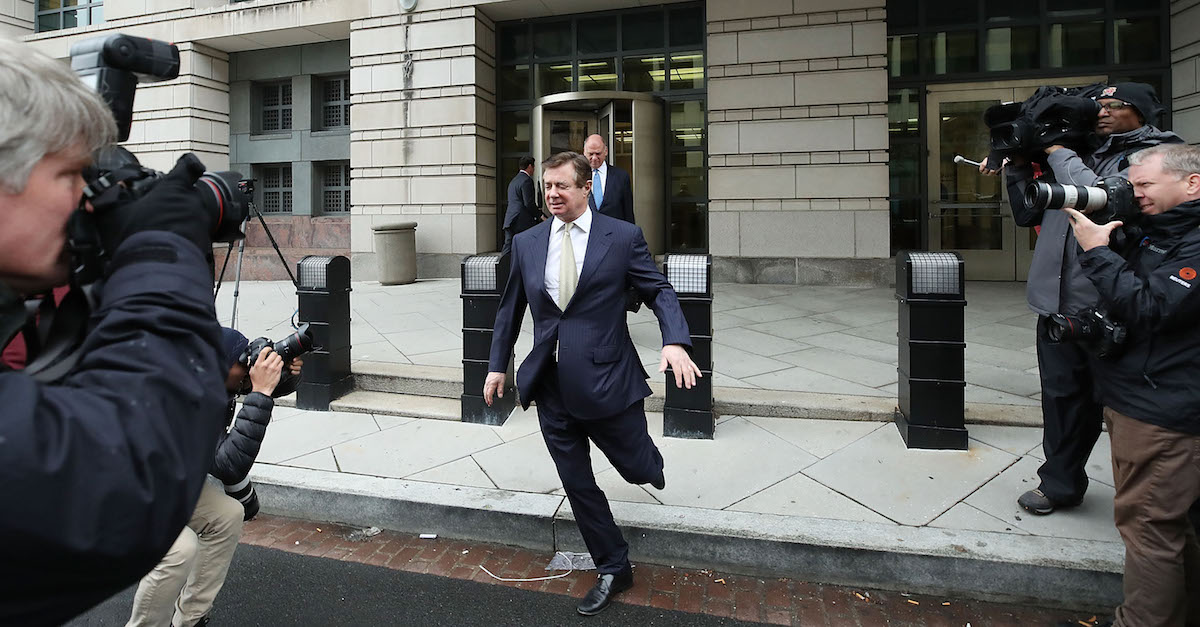
The final half of Tuesday’s proceedings in the government’s case against Paul Manafort called to mind an aphorism originally supplied by legendary Hoosiers basketball coach and angry person Bobby Knight: “Put yourself in position to be in position.”
After returning from lunch, the defense officially–and quickly–rested its case in front of the jurors, who were sent home early to enjoy their respective afternoons. Upon seating the jury, Judge T.S. Ellis III inquired as to whether the jurors’ lunches “were adequate.” The jury assented with words and nods. The lunches were fine.
Judge Ellis then described the following series of events scheduled for the remainder of the day: (1) the prosecution and defense counsel would be provided a package of drafts in three sections: standard opening instructions; standard substantive instructions; standard closing instructions; (2) each side would hash out, with the court, any “agreed upon” changes–like spelling errors and whatnot–(3) the court would then hear objections, i.e., “not agreed upon” changes; and (4) then the verdict form would be discussed.
As Tuesday’s business in the Eastern District of Virginia drew to a close, however, most of those issues were short-circuited by the defense and prosecution working in tandem. Discussion first turned to a judicial notice request filed by the defense. The issue here was whether the court would mention that on December 27, 2017, the special counsel’s office charged Manafort with various crimes and moved to forfeit two properties — one in New York City and one in the Hamptons.
Judge Ellis tilted his hand right out of the gate by remarking that he didn’t think this was relevant.
The defense, represented by Richard Westling, argued that it was relevant because testimony by immunized banker James Brennan may have led the jury to believe the Federal Savings Bank wrote off loans on those properties because Manafort failed to stay current on his mortgage.
This wasn’t exactly the case.
Westling explained, “The reason [the bank wrote off those loans] is clearly the effect on those properties and impact of government action.” That is, the government’s attempt to confiscate said properties.
Assistant U.S. Attorney Greg Andres argued against the judicial notice request, noting, “He pledged to keep up the payments,” on the properties in question, but failed to do so. This is because certain of Manafort’s funds were seized by the government later on.
Judge Ellis was never persuaded of the defense’s argument, but took the opportunity to criticize the media. He said, of the written off loans, “The journalists all ran with it. Put a big headline on it…about a loss…I’m not sure that’s accurate either…we don’t know how much of a loss.”
Ultimately, Ellis decided the issue was too confusing and prejudicial. No evidence had been supplied and Brennan’s testimony was admittedly imprecise and unsure. The defense lost their judicial notice motion but the judge advised both sides they could argue about it in their closing statements if they wanted to, cautioning only that neither side could mention the seized bank account funds or “use the newspapers.”
Andres offered, “I haven’t been reading them either your honor.”
To which Ellis replied, “Good for you.”
Despite Judge Ellis’ intent to go through the remaining procedural matters in the above referenced manner, jury instructions proved decidedly uncontroversial as both the defense and prosecution agreed on most of the supplied verbiage. For a detailed summary of those proceedings see Law&Crime’s additional reporting here.
[Image via Mark Wilson/Getty Images]
Follow Colin Kalmbacher on Twitter: @colinkalmbacher
Have a tip we should know? [email protected]